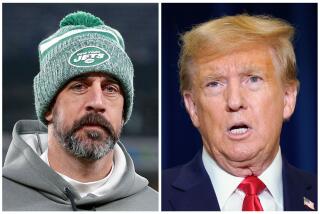Fast Food, Slow Trial: Verdict Is Due in McDonald’s Libel Case
LONDON — A judge’s verdict in the longest trial in British history should come next week, but two penniless British activists locked in a bizarre David and Helen and Goliath battle with McDonald’s say victory is already at hand.
Across 313 trial days, London environmentalists Helen Steel and David Morris--with combined starting legal knowledge of zero--acted as their own defense counsel to fight off a Big Mac attack mounted by some of the slickest lawyers in the realm.
Originally expected to last a few weeks, the libel case has pitted the activists’ assertion of the right to free speech against a corporation’s right to protect itself from libelous accusation. It has been called the biggest food fight in British history and a multimillion-dollar public relations disaster for the $30-billion-a-year company.
Whatever the verdict, classic underdogs Morris, an unemployed postal worker, and Steel, a part-time bartender, have already won the popularity stakes.
Their ants vs. elephant struggle has generated:
* A two-night, three-hour British television reconstruction, “McLibel!”;
* A book, “McLibel: Burger Culture on Trial”;
* And international sympathy that includes a World Wide Web site with 19,000 pages of court transcripts already browsed by 9 million visitors (https://www.mcspotlight.org/).
*
Meantime, more than 2 million anti-McDonald’s leaflets have been distributed in Britain and many more abroad since the legal battle began, according to Morris and Steel.
McDonald’s says it took the activists to court as a last resort and as a matter of principle: False accusations against its good name and business practices cannot go unanswered.
The McLibel case began in 1990 when the fast-food giant filed libel charges against Steel and Morris for distributing a leaflet titled “What’s Wrong with McDonald’s.”
The activists, known by admirers as the McLibel Two, handed out the leaflet as members of London Greenpeace, the independent environmental group that produced it. The organization has no connection with Greenpeace Ltd. of international renown.
The leaflet asserted that McDonald’s destroys rain forests, flouts environmental concerns with its packaging, sells dangerously unhealthy food, seduces children into unhealthy eating habits, exploits staff, particularly blacks and women, and is responsible for torturing animals.
McDonald’s rejects all of the claims in the leaflet, which it says has been distributed in Britain and around the world since 1986. “If McDonald’s did not take action to correct these lies, it would be assumed to be true and come to form part of public perception about McDonald’s,” company communications director Mike Love said here.
McDonald’s says that evidence at the trial from independent experts and employees demonstrated that, one by one, the allegations are untrue and libelous. The company says it is environmentally responsible, sells food that is a valuable source of energy, advertises responsibly, demands that its suppliers respect animal welfare and offers its workers competitive pay and working conditions.
“The action was not about individuals, it was about establishing the truth,” Love said. “Neither was it about freedom of speech. It was about the right to stop people distributing damaging libels.”
From their scruffy north London defense office above a carpet shop, Steel and Morris, unrepentant and assertive, argue that McDonald’s is not a special case but symptomatic of a destructive corporate culture.
“McDonald’s is just one example--we feel that it is like the other big corporations which damage the environment and exploit workers,” said Steel, now 31, a onetime gardener who says she takes home around $100 a week tending bar.
“McDonald’s sells junk food, but this is also about workers’ rights, social issues and the environment. We are defending our right to hold these views,” said Morris, now 43 and a single parent who lives on welfare.
More than 100 witnesses, ranging from senior McDonald’s executives to activists and current and disgruntled former workers, testified under scrutiny from McDonald’s high-starch legal team and Morris and Steel in sweaters and jeans.
“We weren’t sure that we were up to it, but we decided to represent ourselves after we realized there was no legal aid or representation available to us in a libel case,” Morris said.
Under draconian British libel law, the burden of proof is on the defendant and not on the plaintiff, as is the case in the United States.
McDonald’s does not comment on published reports that its legal fees may top $10 million, but British newspapers have estimated that the company’s lead attorney was paid a trial fee of $3,000 per day. Legal tyros Steel and Morris, after devoting four years full time to a defense supported only by voluntary contributions, have a combined annual income of around $12,000.
“Just because they have massive resources, they cannot intimidate people to silence,” Steel said.
*
For both campaigners, it is politics that underpins the activism. “We are anarchists in the good sense of the word. We believe in do-it-yourself politics. We believe in people having control of their lives and communities rather than having things decided for them by governments and multinational corporations,” Steel said.
Judge Rodger Bell heard the case without a jury and has been weighing the evidence since eight days of closing arguments ended Dec. 13. If he finds for the plaintiffs next week, McDonald’s also will win a court order against further distribution of the leaflets. McDonald’s Love says the company does not seek damages that would bankrupt Morris and Steel and will not ask for costs.
But a finding against the McLibel Two would stand as a powerful object lesson to such crusaders everywhere.
Victory for Steel and Morris would be a grave blow to an international corporation with 21,000 restaurants worldwide--more than 700 of them in Britain.
In a real sense, however, the McLibel Two have nothing to lose. Even if they are enjoined from distributing the original disputed material, the accusatory leaflet itself has gone through a number of modifying editions, and none of them is at legal issue.
Sympathizers organized as the McLibel Support Campaign, which posted the Web site but is not directly connected to the defendants, have proclaimed a win or lose “Victory Day” next Saturday for leaflet campaigning against British McDonald’s outlets.
“We haven’t come this far so that we will allow ourselves to be silenced now,” Steel said. The McLibel Two, courtroom veterans by now, are already planning legal counterattacks if the verdict is adverse.
More to Read
Inside the business of entertainment
The Wide Shot brings you news, analysis and insights on everything from streaming wars to production — and what it all means for the future.
You may occasionally receive promotional content from the Los Angeles Times.










